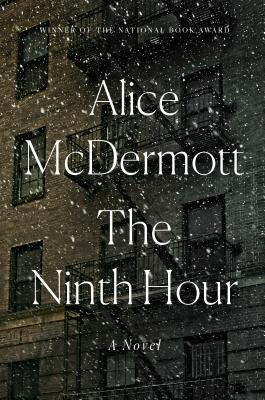Fairness demanded that grief should find succor, that wounds should heal, insult and confusion find recompense and certainty, that every living person God had made should not, willy-nilly, be forever unmade.As a look back at Irish-Catholic Brooklyn in the early twentieth century, The Ninth Hour captures the spirit and the grime; the human and the divine; all played out over a generations-long saga of secrets and sacrifice. There's much quiet wisdom in Alice McDermott's observations, but ultimately, this was too quiet for me; it never caught fire, never sparked. After too-long reflection, I'm not much inspired to write a review; but onward, weakly.
The baby, a daughter, was born in August, just three weeks after the old nun died. She was called Sally, but baptized St. Saviour in honor of the Sister's kindness that sad afternoon. That damp and gray afternoon when the pilot light went out. When our young grandfather, a motorman for the BRT whose grave we have never found, sent his wife to do her shopping while he had himself a little nap.The book opens with our motorman, Jim, waving his young and pregnant wife, Annie, out the door before offing himself. Passing by the scene later, attracted by the buzz of police and firefighters on the sidewalk, elderly Sister St. Saviour of the Little Nursing Sisters of the Sick Poor looks in on the situation. Ultimately unable to pull off a quiet Catholic burial for the dead man, Sister St. Saviour arranges a job for Annie in the convent laundry, where she raises her infant daughter, Sally, amongst a gaggle of pious nuns. As theirs is a nursing order, we follow along as the Sisters deal with death and disease, abuse and orphanings; often the only care the poor residents of this neighbourhood will receive; often with gobs of body fluids spattering us all. We eventually learn the backstories for the nuns, and I appreciated that they are all presented as real, strong individuals; women with personalised understanding of and relationships with God. Rules (and laws) are bent and broken, sins overlooked and minimised, and in their own ways, each of the nuns has an idiosyncratic idea of God's Judgement, which makes for interesting contrast –
Sister St. Saviour on her heavenly ledger of deeds, good and questionable: Hold it against the good I've done. We'll sort it out when I see You.
Sister Illuminata on atoning for the sins of a loved one: Prayer and good work together will surely move our Lord to grant you what you ask for.
Sister Jeanne on sacrificing one's immortal soul for the sake of another's worldly happiness: I lost heaven a long time ago...Out of love, I lost it. Which sounds funny, doesn't it? You'd think you could only lose heaven out of hate. But I lost it all the same...God knows my heart. So I don't ask for His forgiveness, see?
Sister Lucy on the futility of asking for God's intervention: I've never believed our God is a bargaining God, but men do. It's nonsense. While he was praying for her to live, she was praying to die. Which one of them struck the bargain?
Much is written about sacrifice: People trade their Earthly happiness for others' mortal souls; others imperil their own mortal souls for the happiness of loved ones. A man is paid to take another's place during the Civil War, and when he returns broken, an unrelated woman gives up her life to care for him in a chaste and selfless imitation of the Little Nursing Sisters of the Sick Poor. The Sisters themselves are all sacrifice, and the motorman, Jim, was able to convince himself that he unhooked the gas hose in order to set his overburdened wife free. And much is written about secrets and fate: When the narrative gets to its tangled end and the reader can finally trace the climatic tragedy back to its root cause, everything is related, and everything affects everything else, and why was that, again, that you were out poking around in strangers' backyards, Mrs. Costello, when the dog bit you? The Ninth Hour is about ideas, but it's slow and tangled and often confusing in their illustration.
It is soon revealed that this story is being told in the modern day (“When our father was very old” and “we were getting old ourselves”) by the children of the unborn baby in the opening scene, and it was often unclear to me who was being discussed as each new chapter began; it seemed to come from left field, to me, to suddenly read about Aunt Rose and Red Whelan and others from the narrator's father's side. And there is much domestic melodrama, including a climax that I didn't understand (How did anyone know what was wrapped in the handkerchief? Or that there was something wrapped in a handkerchief inside a closed purse?), and which I ultimately didn't believe. Not all of the family secrets are revealed to the children (So how do they know about them to write about them?), but after a lifetime of listening to their parent's stories, and those of Sister Jeanne who continued to visit throughout her life, they conclude: “We marvelled to think of it: how much went unspoken in those days. How much they believed was at stake.” And, again, that's an interesting conclusion: much is interesting here, just not totally, personally engaging.
(There is a hunger.) Lies, big or small, never stay hidden. (Love's a tonic, not a cure.) Sometimes a woman just needs to go out to catch her breath. (We are as He made us.)The Ninth Hour isn't a waste of time, I note that many other readers find it perfection, but it didn't do enough for me.

